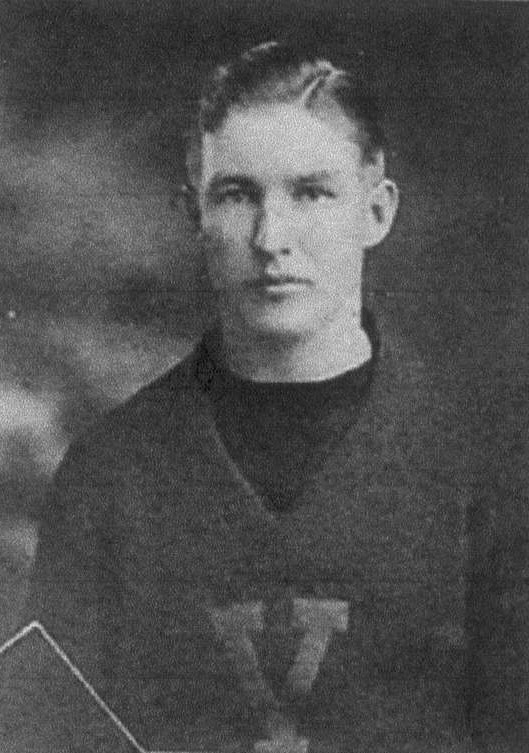Nov. 5, 2015
Commodore History Corner Archive
Vanderbilt football has officially recorded 37 former players to make an All-American team beginning in 1906 with Owsley Manier to Jordan Matthews in 2012-13. But, a recent discovery reveals a “forgotten” All-American that should be added to that prestigious list.
David Argillus “Gil” Reese (1922-25) was a Third Team All-American selection by International News Service in 1923-24 that was officially recognized by the NCAA. Reese was born in 1901 in Tupelo, Miss., and nicknamed “The Tupelo Flash” and “Mississippi Meteor.” At Vanderbilt, Reese excelled in football, basketball and baseball. As a senior, he was the first Commodore to become a captain in all three sports.
Reese attended Tupelo High School with his younger brother, Andy, who played baseball at Vanderbilt and Major League Baseball with the New York Giants (1927-30).
On the gridiron Reese wore No. 11 and weighed 155 pounds to became a Vanderbilt football sensation, beginning with his freshman year. These are some highlights of Reese’s football career:
1922  In the second game of the season against Henderson Brown, Reese scored his first career touchdown on a first quarter 70-yard run that help the Commodores to a 33-0 win. The powerful Michigan Wolverines arrived in Nashville to play in Dudley Field’s dedication game that ended in a scoreless tie.
As a starter, Reese recorded 105 yards on punt returns, with his longest for 24 yards. In an Atlanta Constitution article written by Walter Camp, he praised Vanderbilt’s effort against the Wolverines and singled out Reese. The next game at Texas, Vanderbilt won 20-10 with Reese scoring all three of the Commodores touchdowns. Vanderbilt concluded the season 8-0-1.
1923  Reese was a marked man for the rest of his football career. In the Tennessee game, won by Vanderbilt 51-7, Reese rushed for 214 yards and scored five touchdowns that included three on punt returns of 70, 49 and 29 yards. In the next game with Georgia on campus, the Commodores upset the Bulldogs for a 31-7 victory.
Reese scored four touchdowns with two more off punt returns of 63 and 81 yards. He ran for over 200 yards against the Bulldogs, who were considered the best team in the South that season. Morgan Blake of the Atlanta Journal wrote, “When you say that Mr. Reese is a combination of greyhound, rabbit, antelope, and a greased pig you mildly do this gentleman justice.”
In the final game, Reese scored the game’s only touchdown in a 7-0 victory against Sewanee on a pass reception. The Commodores were 5-2-1 as Reese was named to the All-Southern team.
Davis J. Walsh, representing International News Service, named Reese as Third Team All-American. The NCAA officially recognized that organization’s selections. Commodore teammate, Lynn Bomar, was a consensus All-American that season and became a member of the College Football Hall of Fame in 1956.
Billy Evans of “Southern Honor Roll” selected Reese to his All-American team. Evans was an American League umpire (1906-27) and selected into the National Baseball Hall of Fame by the Veterans’ Committee in 1973. The NCAA did not officially recognize his football All-American teams. Evans was also the sports editor for Newspaper Enterprise Association (1918-28).

1924  In the second game of the season, Reese recorded four touchdowns in a 61-0 rout over Birmingham-Southern. Ralph McGill of the Atlanta Constitution wrote about Reese’s performance.
“He stars,” McGill wrote. “A man dashes at him and goes sprawling on the ground. There is another. A twist of the body and a step to the side and he is gone, left to lie on the sod and meditate on the fate that is his. Three or four men rush at him. There is a swirl of action, flying feet and diving bodies, and out of itâ€â€Reese running with the grace of a deer. Reese’s action is never desperate. He never seems harassed or hurried. His spectacular runs are things of athletic beauty. There is no lost motion. It is perfect.”
In a 3-0 loss to Georgia, Bomar suffered an injury that ended his college football career. Bomar was kicked in the chin that gave him a severe brain hemorrhage leaving him partially paralyzed for two days.
Reese said about his teammate, “He would never let them jump on me. Whenever anyone would threaten me, Bomar was always right there to say, ‘Keep your hands off that boy.'”
Against the Quantico Marines, a 13-13 tie, Reese scored one touchdown and the next week dashed 54 yards on a punt return against Mississippi A&M (Mississippi State) aiding the Commodores in their 18-0 victory. While at Minnesota, the Commodores recorded their first win over a northern school, defeating the Gophers 16-0. Reese caught a 10-yard touchdown reception in the win. Vanderbilt finished the season 6-3-1 as Reese was named All-Southern for the second year.
Norman E. Brown selected Reese to his Central Press Association Third Team All-American squad. The NCAA did not officially recognize Brown’s football All-American teams. Commodore end, Hek Wakefield, was a consensus All-American that season.
1925 – Taking off some of the spotlight on Reese was the arrival of Bill Spears (1925-27), who would become a consensus First Team All-American back as a senior. In the game against Tennessee, Reese dashed 95 yards for a touchdown for his longest of a four-year career. In writing about Reese’s final game of his career, a 19-7 loss to Sewanee, Fred Russell’s Fifty Years of Vanderbilt Football stated, “Gil Reese played one of his greatest games but sobbed as he pulled off his No. 11 jersey in the locker room. He was through.”
Vanderbilt was 6-3 that year. In Reese’s four gridiron seasons as a Commodore halfback, his teams were 25-8-3, which included two Southern Conference championships. Reese appeared in the first annual East-West Shrine Game held on December 26, 1925 in San Francisco. His East squad lost 7-0.
Reese was selected as Vanderbilt’s “Bachelor of Ugliness” a title given to the male undergraduate believed to be the most representative of the morals, values and popularity that the university offered. In 1934, Reese was named on Vanderbilt’s All-Time football team.
Reese signed a baseball contract with the Nashville Vols of the Southern Association, but did not appear in any games. In 1927, Reese was head football coach for the New Bry’s Hurricanes (later Memphis Tigers) of the new minor league American Football League with a 3-0-1 record. In 1936, Reese coached at Sacred Heart High School in Memphis. Reese died in 1993 in Obion, Tenn., at the age of 92.
Traughber’s Tidbit: Vanderbilt football players playing baseball with a football? That was a drill that Coach Dan McGugin (1904-17, 1919-34) held on Vanderbilt’s baseball diamond according to former end and captain Bob Blake (1904-07). Blake wrote a column for the Atlanta Georgian in 1912 where the McGugin’s practice sessions and techniques were discussed. Blake wrote in part about the forward pass that was implemented into college football in 1906:
“In the early days of the past eastern coaches derided it [forward pass]. It was considered a species of basketball. While they were doing that McGugin was developing it and it has proved an important factor in his success. In 1907, for instance, a year when the pass reached high development, it enabled Vanderbilt to win the Sewanee game and the Navy game.
“Every man on the Vanderbilt team is a trained receiver of passes and practically all of them are good at passing the ball. The long straight shot is Dan’s own specialty and he has taught his men the trick of the thing. Sometimes in the early part of the season the entire squad would quit playing football and have a game of baseball with a football for the ball. That kind of practice makes them sure in the handling of the most difficult passes while hours and hours of patient drilling in the proper throwing of the ball make it reasonably certain that the passes will be properly made.”
(Imagine throwing out a runner at first base from the third baseman’s position with a football or from the outfield.)
Tidbit Two: Vanderbilt has hired several assistant football coaches that would leave the Commodores and gain prominence as a head coach and be selected to the College Football Hall of Fame or Pro Football Hall of Fame.
They are listed with years at Vanderbilt and primary schools coached: Wallace Wade (1921-23) Alabama and Duke; Paul “Bear” Bryant (1940-41) Alabama; Tommy Prothro (1946-48) Oregon State and UCLA; Charlie McClendon (1952) LSU. Wade and Bryant won national championships and have stadiums named for them.
Bill Parcells was an assistant coach at Vanderbilt (1973-74) and won two Super Bowls with the New York Giants. Parcells was selected to the Pro Football Hall of Fame in 2013. Buddy Ryan was an assistant coach at Vanderbilt (1966) and became a defensive guru in the NFL and a head coach. Ryan has been on a preliminary nominee list for the Pro Football Hall of Fame.
If you have any comments or suggestions contact Bill Traughber via email WLTraughber@aol.com.


